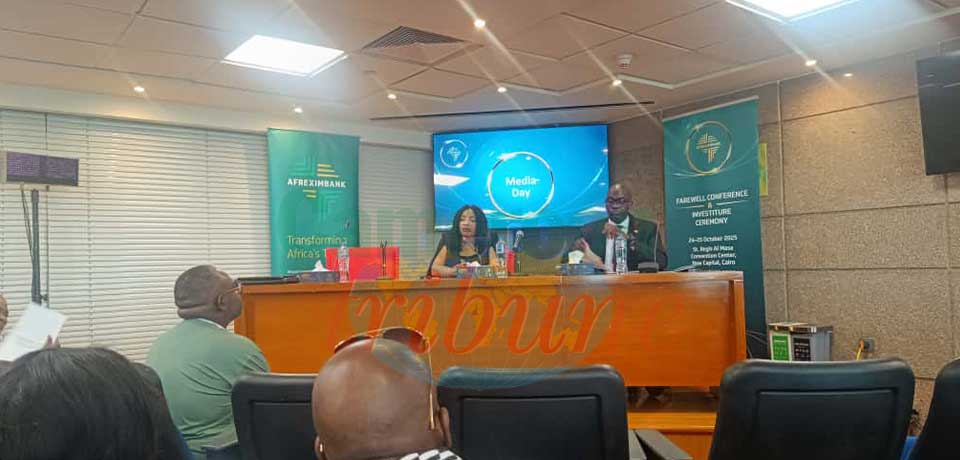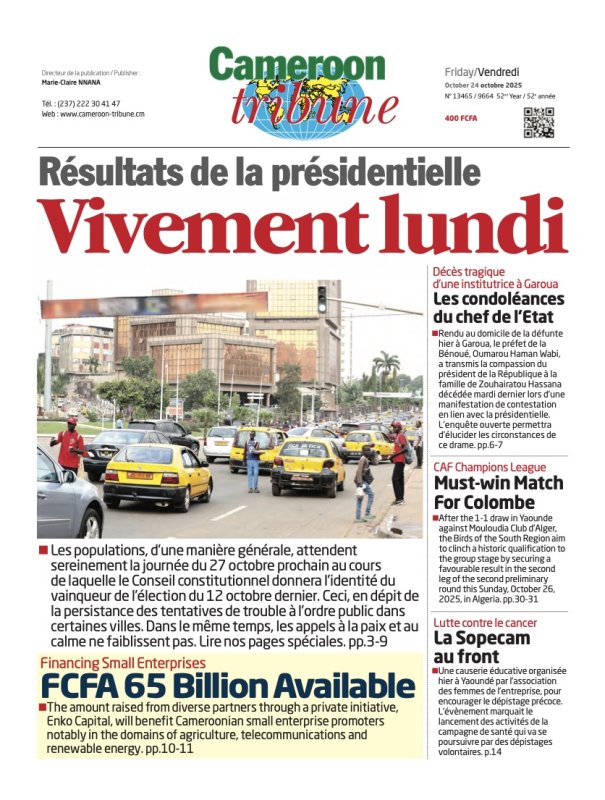Import Substitution : Experts Share Success Stories, Concerns, Way Out
- Par Kimeng Hilton
- 29 Jul 2025 18:45
- 0 Likes

The three-day Cameroon Academy of Sciences-organised “Week of Science at the Service of Development” opened in Yaounde on July 29, 2025.
The Cameroon Academy of Sciences, CAS on Tuesday July 29, 2025 in Yaounde began its third “Week of Science at the Service of Development,” running from July 29-31, 2025. The theme is “Effective and efficient implementation of the import-substitution policy: Leveraging science, technology and innovation to overcome challenges and accelerate the process.” The event was opened by the Minister of State, Minister of Higher Education, Prof. Jacques Fame Ndongo, who stood in for the Prime Minister, Head of Government, Chief Dr. Joseph Dion Ngute.
What It Is About
Import substitution is a trade and economic policy that seeks to replace foreign products with domestic products. The idea is to prioritize domestic production and reduce dependence on international markets, thereby strengthening the country's economic independence.
Potential Gains
Organisers of the event say embracing import substitution is a strategy to strengthen domestic production and foster economic independence. This represents a viable solution to Cameroon’s development challenges, long-term stability and growth prospects. By prioritizing the development of domestic industries, Cameroon can lay the foundations for sustainable economic growth, job creation, and national resilience.
Local Inventions
According to Minister Jacques Fame Ndongo, we live in an era when scientific knowledge fashions our lives. Import substitution is the pillar of independence and economic wellbeing, he noted, saying currency fluctuations and other factors affect any country’s sovereignty … Import substitution is indispensable … "But each local invention strengthens our local industries,” he stressed.
Making It Reality
For import substitution to happen, three key actions must be undertaken, Prof. Fame Ndongo insisted. There are: strengthening research in universities and private higher institutions of learning; encouraging public-private partnerships; and developing curricula for entrepreneurial spirit. The Minister urged scientists to simplify their procedures and increase the number of mentoring programmes for young entrepreneurs.
High Wheat Productivity
He disclosed with pride that Cameroon’s wheat productivity in the Adamawa, West and North West Regions is between 7-8 metric tonnes per hectare. Which is higher than Ukraine’s 4 metric tonnes per hectare, though Ukraine’s wheat production is by far higher than Cameroon’s.
Future Hangs On Local Discoveries
“Our future depends on our ability to make local discoveries … We have long relied on imported knowledge and scientific tools that have not always helped us. … We can replace imports with competitive local alternatives… Let us harness our collective intellect to test and export our own products,” he urged the scientists gathered in Mont Febe Hotel, Yaounde. Prof. Jacques Fame Ndongo expressed gratitude from the Prime Minister to the President of the Cameroon Academy of Sciences, Professor Emeritus Beban Sammy Chumbow. For the theme of the 2025 Cameroon Academy of Sciences “Week of Science at the Service of Development.”
No Consistent Support
Earlier in his opening remarks, Prof. Chumbow thanked government for the support to CAS, saying the academy’s work impacts the nation, but it lacks the resources to do more. Prof. Chumbow then pleaded with government for support, saying only a few ministries offer CAS intermittent support at their discretion. He appealed to State and private institutions and organisations to work with CAS on import substitution.
Timely, Significant
The President of the Nigerian Academy of Sciences, NAS, was represented by Prof. Musbau Adewumi Akanji, the Vice Chancellor of the University of Minna, Nigeria. He said NAS has been collaborating with CAS. He described the theme of this year’s Week of Science at the Service of National Development (“Effective and efficient implementation of the import-substitution policy: Leveraging science, technology and innovation to overcome challenges and accelerate the process”) as “timely and significant.”
Prof. Akanji noted that Africa has been overdependent on foreign goods at the detriment of local innovation. He said NAS was committed to supporting local efforts, the gathering and sharing of knowledge, and deepening of collaboration.
Let STI Impact Development!
The Executive Secretary of the Cameroon Academy of Sciences, Prof. Francois-Xavier Etoa recalled that CAS’ work is to support government, institutions and the private sector. The main objective being to make Science, Technology and Innovation, STI, the centre of development.
Prof. Wilfred Mbacham, the General Coordinator of the 2025 Cameroon Academy of Sciences Week of Science, commended the Prime Minister and Head of Government for supporting the organization of the week, saying the PM looks forward to good recommendations. He then called up various personalities to present their keynote addresses on how make effect import substitution reality.
Keynote Addresses
Prof. Eddy Ngonkeu spoke on “The production and processing of wheat in Cameroon: Source of revenue for the economy.” He presented his Presidential prize-winning June 2022 research on wheat production in Cameroon. Prof. Ngonkeu said his research revisited why the State-run wheat producing outfit in Wasande in Adamawa Region, SODEBLE, shut down – unsuitable soil and wheat variety, and challenges with agricultural practices and processing.
Wheat Production Dividends
The problem was corrected with soil acidity “restructured”, 22 wheat varieties developed, multiplied and distributed in all 10 administrative regions. To the extent that wheat is now cultivated in Yaounde! Prof. Ngonkeu paid tribute to President Paul Biya for ordering a grant of over 1 billion FCFA to promote wheat farming in the country. Similarly, 22 wheat by-products have since been developed.
Though there are still challenges with drying and stocking wheat, Prof. Ngonkeu announced that wheat productivity has reached 9 metric tonnes per hectare in Oku, Bui Division of the North West Region. With total national wheat now standing at a million metric tonnes. Concluding, Prof. Eddy Ngonkeu appealed for “economic patriotism” to overcome import substitution challenges.
Other keynote addresses included “Transforming Cameroon’s agriculture: Leveraging AfDB’s TAAT Programme to feed Africa” by Dr Chrys Akem; "Implementing import substitution and promotion of exports" by Prof. Foudjet Amos…
Why Import Substitution?
Cameroon has adopted a policy on “import-substitution” to redynamise the economy and improve the standards of living of citizens by reducing imports with concomitant maximization of local production and export of the local products. This reflects President Paul Biya’s appeal and directive to Cameroonians to “consume what we produce and produce what we consume.” It is also in consonance with the Cameroon Academy of Sciences statement of 29 May 2022 on import-substitution titled, “Response to the local production of wheat and flour.”)
Making Policies Work
Discussions on the Import-Substitution Policy show that there are issues of clarity, challenges and potential impediments to the effective implementation of the policy need to be addressed. In many African countries, there is often a gap between policy and policy implementation. That is, policies exist, but their implementation is delayed or run against formidable obstacles.
Due, inter-alia, to a number of foreseen and unforeseen issues and challenges that ultimately constitute impediments to the implementation of the policy. Science, Technology and Innovation, STI, therefore have a significant role in bridging this gap and ensuring effective and efficient policy implementation.
Various Experts
This is what is envisaged for the Cameroon Academy of Sciences (CAS) “Week of science at the service of national development.” Teams of researchers and field experts from different ministries and the economic sector will identify, elucidate and recommend solutions to potential issues and challenges to facilitate and enhance implementation of the import substitution policy in each sector.
Looking Within
Meanwhile, the benefits of import substitution include reduction of reliance on foreign products; stimulation of domestic industries and creation of new job opportunities; the potential to enhance technological capabilities and innovation within domestic industries. And reduction in trade deficits and improvements in the balance of payments.
Challenges With Economy
Despite Cameroon's strong agricultural potential due to its favor...
Cet article complet est réservé aux abonnés
Déjà abonné ? Identifiez-vous >
Accédez en illimité à Cameroon Tribune Digital à partir de 26250 FCFA
Je M'abonne1 minute suffit pour vous abonner à Cameroon Tribune Digital !
- Votre numéro spécial cameroon-tribune en version numérique
- Des encarts
- Des appels d'offres exclusives
- D'avant-première (accès 24h avant la publication)
- Des éditions consultables sur tous supports (smartphone, tablettes, PC)














Commentaires